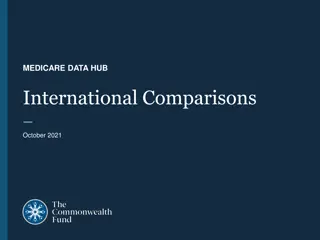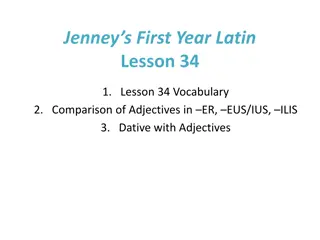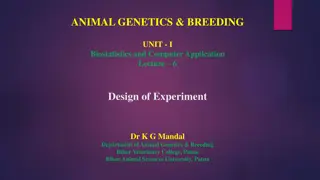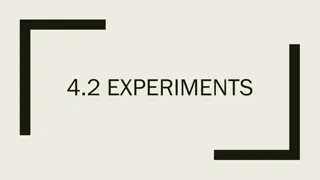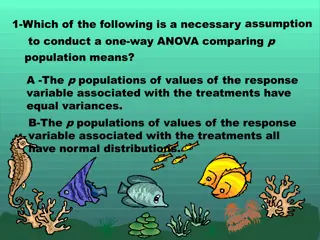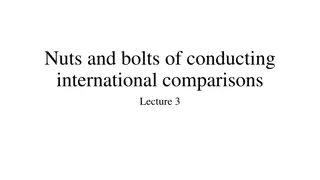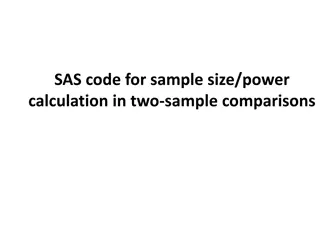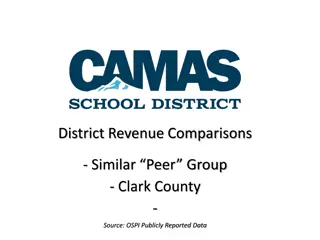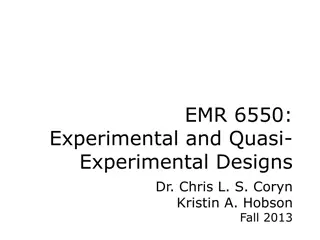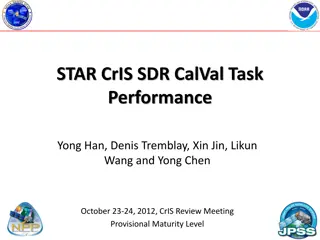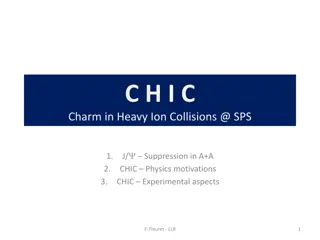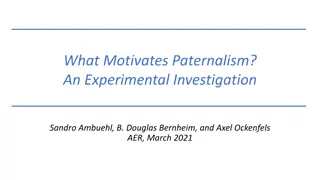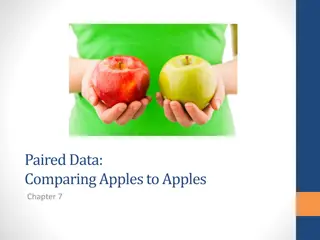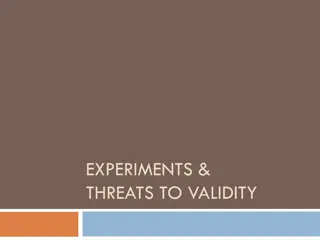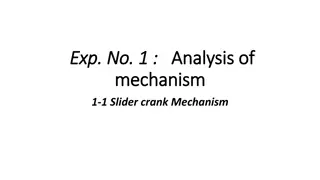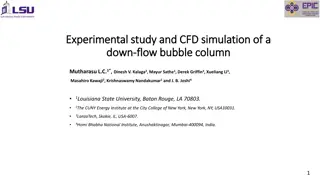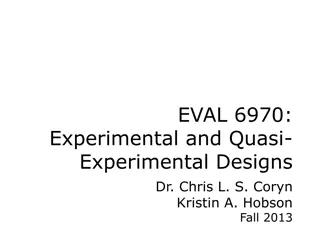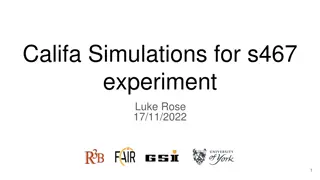Introduction to Experimental Economics by John Hey: A Comprehensive Overview
Explore the interconnected realms of Experimental Economics and Behavioral Economics through the insightful lectures of John Hey, an Emeritus Professor at the University of York. Discover the methodology of testing economic theories for validity and the practical applications of experimental economi
1 views • 58 slides
Insights on Experimental ASF Vaccines in Pig Studies
The research conducted by Prof. Jishu Shi and his team at Kansas State University delves into the safety and efficacy testing of experimental African Swine Fever (ASF) vaccines using pigs as the model. Various vaccines, including DNA vaccines and live attenuated viruses, were tested against differen
4 views • 13 slides
University of Florida Cost Comparisons Directives
The University of Florida has established directives for cost comparisons related to business travel expenses. These guidelines ensure that the university is not paying for costs unrelated to official business. University travelers are required to obtain cost comparisons for upgrades, convenience, a
4 views • 23 slides
Analytic Hierarchy Process (AHP) for Sustainable Smart Industry Curriculum Development
Intelligent Decision Support Systems and the Analytic Hierarchy Process (AHP) play a crucial role in the development of a Master's Degree Program in Industrial Engineering for Thailand's Sustainable Smart Industry. AHP, developed by Thomas Saaty, aids in measuring intangible factors through paired c
0 views • 23 slides
International Comparisons of Medicare Programs: October 2021
The international comparisons of Medicare programs in October 2021 reveal key insights into coverage types, affordability, and healthcare costs among older adults in various high-income countries. Private plans in the U.S. offer primary, supplemental, and prescription drug coverage, similar to model
2 views • 12 slides
Latin Lesson 34 Vocabulary: Adjective Comparisons and Dative Constructions
Learn about adjectives in ER, EUS/IUS, ILIS forms, and how they are used in comparisons. Explore dative constructions with adjectives and enhance your Latin vocabulary with words like "aureus" (golden), "dexter" (right), "difficilis" (difficult), and more.
1 views • 32 slides
Understanding Nonexperimental and Quasi-experimental Studies
Nonexperimental and quasi-experimental studies resemble experiments but lack random assignment, making them valuable for group comparisons without establishing causation. This type of research design looks at differences between groups that already exist, focusing on group differences rather than ca
1 views • 35 slides
Design of Experiment in Animal Genetics & Breeding: Principles and Methods
Biostatistics and computer applications play a key role in the design of experiments in animal genetics and breeding. Proper allotment of treatments to experimental units is crucial to study treatment effects accurately. Designing experiments helps in maximizing information from available resources,
0 views • 37 slides
Understanding the NAESB Nomination Models for Ranking and Comparisons
Explore the NAESB Nomination Models used in the energy industry for ranking and comparisons. Learn about threaded and non-threaded pathed activities, as well as how ranks are applied to scheduling restrictions and balancing transactions. Discover the flexibility and dynamics of these models in manag
0 views • 10 slides
Understanding Experiments in Research: Observation vs. Experimentation
Observation and experiments are two crucial methods in research. An observational study involves observing and measuring variables without influencing responses, while an experiment deliberately applies treatments to measure responses. Confounding variables can affect the results, and factors like e
0 views • 13 slides
Understanding Experimental Psychology: Designs and Control Issues in Research
This content delves into the basics of experimental research, focusing on different types of experimental designs and control issues. It covers between-group and within-group designs, discussing advantages and disadvantages, as well as methods for controlling for nonequivalence. The importance of ra
0 views • 26 slides
Understanding ANOVA in Experimental Design
In this educational content, we delve into the key concepts of ANOVA (Analysis of Variance) in experimental design. Topics covered include the necessary assumptions for conducting one-way ANOVA, the importance of testing factors in two-way ANOVA, various types of sum of squares, comparisons between
1 views • 15 slides
Understanding Probability: Experimental and Theoretical Concepts
Probability is the measure of the likelihood of an event happening, with experimental and theoretical probability being key concepts. Experimental probability involves determining probabilities through experience or experiments, while theoretical probability can be calculated without prior experienc
2 views • 23 slides
Calculation and Validation of Thermal Neutron Diffusion Length in Water at Elevated Temperatures
This research focuses on the validation of thermal neutron diffusion experiments in water at elevated temperatures. Various methods, including the pulsed-neutron die-away and static relaxation length methods, were used to determine the diffusion length (L). Through linear and power fits based on dat
0 views • 7 slides
The Essentials of International Comparisons: Lecture Highlights
Delve into the intricacies of conducting international comparisons with a focus on country selection, strengths, limitations, hypothesis testing, and more. Explore various methods like multi-level modeling and grasp the significance of senate weights. Gain hands-on experience with cross-national com
0 views • 53 slides
SAS Code for Sample Size and Power Calculation in Two-Sample Comparisons
SAS code snippets are provided for conducting power and sample size analyses in two-sample comparisons using the TWOSAMPLEMEANS statement. The code covers scenarios such as two-sample t-tests assuming equal variances, unbalanced designs, unequal variances, and more. Examples and syntax are included
0 views • 10 slides
Quiz Review on Scientific Method and Graphing
Explore a quiz review covering topics related to scientific method, graphing, and experimental design. Understand key concepts such as hypothesis, scientific law, theory, variables, and experimental control through detailed questions and images. Test your knowledge on laboratory safety, inferences,
0 views • 14 slides
Exploring Paired Comparisons Testing Dimensions in Cultural Domains
Studying attributes in cultural domains involves various methods like free listing, pile sorts, and triad tests. Rating scales and paired comparisons are used to evaluate items based on attributes. Paired comparisons produce rank-ordered lists and can be done effectively with tools like Anthopac, en
0 views • 11 slides
Understanding Quantitative Research Designs in Nursing
Delve into the world of quantitative research in nursing, exploring different research designs and the concept of causality. Learn about experimental, quasi-experimental, and non-experimental designs, as well as the characteristics of experimental design like manipulation, control, and randomization
0 views • 22 slides
School District Revenue and Peer Group Comparisons in Clark County
This presentation provides insights into district revenue comparisons within a similar peer group in Clark County, sourced from publicly reported data. It includes targeted peer group comparisons, per student revenue by category, and a comparison specific to Clark County. The visual data highlights
0 views • 8 slides
Quasi-Experimental and Interrupted Time-Series Designs Overview
Explore the various quasi-experimental designs, control groups, pretests, and outcome patterns in research methodologies. Understand the implications of different outcome patterns on causal interpretation and validity threats in experimental studies.
0 views • 31 slides
Performance Review of STAR's CrIS SDR Calibration and Validation Task
This document provides an overview of the performance review conducted on the CrIS SDR Calibration and Validation Task at the STAR Review Meeting in October 2012. Tasks include managerial and technical leadership, trending and monitoring of instrument data quality, inter-sensor comparisons, measurem
0 views • 24 slides
Charm in Heavy Ion Collisions: Experimental Comparisons from SPS to LHC
Investigating charm suppression in heavy ion collisions at different energy levels, this study compares experimental data from SPS to LHC. Analysis suggests similar suppression at SPS and RHIC, with potential factors like recombination and direct J/ψ production influencing results. Uncertainties re
0 views • 16 slides
Comparative and Superlative Grammar Booklet - Page 55 Examples
Explore a variety of examples of comparative and superlative adjectives in this grammar booklet, with images illustrating comparisons such as brighter vs. the most delightful, funnier vs. more terrible, and prettier vs. the prettiest. Learn how to form comparisons with words like less, more, better,
0 views • 14 slides
Understanding Experimental Design in Biology
Explore key concepts in experimental design in biology through clicker questions focusing on hypotheses, variables, control groups, and experimental groups. Learn how scientists test hypotheses and analyze results to draw valid conclusions in biological studies.
0 views • 15 slides
Compilation and Evaluation of Experimental Data for Nuclei in Z=2-28 Region
Completed compilation and evaluation of experimental Pn and half-lives for nuclei in the Z=2-28 region, led by Balraj Singh at McMaster University. The work involved preparing lists of neutron-rich nuclides, identifying potential emitters, analyzing available experimental data for 1n, 2n, 3n, and 4n
0 views • 20 slides
Advances in Ceramic Composite Property Modeling and Experimental Characterization
European research focuses on advanced modeling of C/C, C/SiC, and SiC/SiC composites for aerospace and nuclear applications, with an emphasis on correlating simulations with experimental validation. Laboratories are progressing towards a multiscale approach, integrating micro/nanomechanical characte
0 views • 5 slides
What Motivates Paternalism? An Experimental Investigation
Centuries of normative debate on paternalism have resulted in its ubiquity in various aspects of society, from consumer protection to safety regulations. However, there is a scarcity of empirical studies on the motivations behind paternalistic interventions. This experimental investigation delves in
0 views • 12 slides
Understanding Experimental Studies: Intervention, Characteristics, and Measurements
Experimental studies involve the investigator assigning exposures and following subjects to observe disease development. Different types of experimental studies exist, such as preventive and therapeutic types, each with its limitations, including ethical concerns and challenges in recruiting subject
0 views • 13 slides
Understanding Paired Data Analysis in Research Studies
This content discusses the significance of paired data, its role in reducing variability, and examples of experimental designs used in research studies. Explore comparisons between Meijer and Family Fare prices, and testing The Freshmen 15 theory. Discover how different music types affect studying a
0 views • 55 slides
Understanding Experiments and Threats to Validity
Explore the world of experimental research, internal and external validity, threats to validity, and the importance of proper study design in ensuring the credibility of research results. Learn about confounding variables, threats to internal validity such as environmental factors and group comparis
0 views • 15 slides
Understanding Numbers and Comparisons in Mathematics
Dive into the world of numbers with a focus on large numbers, digits, and comparisons in mathematics. Explore the significance of digits, learn rules for comparing numbers, and practice examples to enhance your understanding. Master the art of determining the smallest and greatest numbers based on t
0 views • 13 slides
Understanding Research Methods and Data Analysis
This review covers topics such as experimental classification, the comparison of non-experimental and experimental research, software features like JMP and SPSS, outlier handling in data analysis, and levels of measurement in statistical analysis.
0 views • 13 slides
Vietnam Neutrino School Overview
Vietnam School on Neutrino is an annual event started in 2017 to promote experimental neutrino physics in Vietnam. Led by Prof. Jean Tran Thanh Van, the school focuses on lectures, software and hardware training, group works, and excursions. With a mix of students from various countries, the aim is
0 views • 7 slides
Analysis of Slider-Crank Mechanism and Experimental Data
Slider-crank mechanism analysis involves understanding the transformation of input motion into desired output motion. This mechanism consists of a crank, coupler, slider, and ground link, converting circular motion into linear motion. Experimental procedures involve setting crank angles and recordin
0 views • 6 slides
Experimental Study and CFD Simulation of a Down-flow Bubble Column
This study and simulation focus on the experimental setup, measurement techniques, and results of a down-flow bubble column. It explores novel features such as inverted bubbly flow, micro-bubble generation, and gas injection. Detailed analysis includes axial and radial variations of volumetric gas h
0 views • 25 slides
Understanding Experimental and Quasi-Experimental Designs
Explore the foundations of experimental and quasi-experimental designs, delving into causal relationships, counterfactual reasoning, and the importance of validating statistical and internal conclusions. Learn about causes, effects, and the complexity of determining causation in research. Discover R
0 views • 46 slides
Understanding Probability: Learning Outcomes and Examples
This content delves into the study of probability, covering topics such as representing probabilities of simple and compound events, calculating relative frequencies, multi-step chance experiments, theoretical and experimental probabilities. It explains concepts like chance experiments, sample space
0 views • 31 slides
Understanding Experimental Studies in Epidemiology
Epidemiological studies and experimental studies play vital roles in understanding cause-and-effect relationships in research. Experimental studies involve manipulating independent variables and measuring dependent variables, with categories such as true experimental, quasi-experimental, and pre-exp
0 views • 22 slides
Califa Simulations and Experimental Observations in Nuclear Physics Research
Exploring nuclear physics research through Califa simulations and experimental observations with a focus on PID gating, clustering algorithms, beam settings, and Ca isotopes chain gating. The study involves simulating events on CH2 targets, analyzing clustering effects, and observing opening angles
0 views • 10 slides




